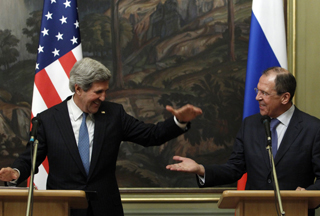Armenia may give up on integration with Customs Union

Following the demonstration of the Armenian National Congress on March 1 and processes in Ukraine, in Armenia people did not pay due attention to US Ambassador John Heffern’s announcement in an interview with Armenpress, which contains several important messages.
There are ideas in between the lines in the Ambassador’s interview, which make us believe that the US are very serious about Armenia, and the impression that following Armenia’s decision to join the Customs Union the US are not very serious to Armenia is not true. Even though this may be true about EU, for the United States it is more logical that the US has revised its policy toward Armenia and will make its efforts more intensive.
Even though it may sound strange but it is not even excluded that the US may try to stop Armenia from integration with the Customs Union, or support processes that may make Armenia’s integration with the Customs Union meaningless. These clues stand behind John Heffern’s interview.
Before or after Kerry’s visit?
Following the interview of US Ambassador John Heffern to Armenpress a part of feedbacks we received concern US State Secretary John Kerry’s visit to Armenia. “We can understand the level of bilateral relations between our countries by looking at the level of bilateral visits. Former Secretary of State Clinton visited Armenia twice. No State Secretary had visited Armenia in the past 18 years. In the end of last year, when foreign affairs minister Edward Nalbandyan met with State Secretary John Kerry, he said that he wanted to visit Armenia, and we hope he will visit Armenia by the end of this year,” said the US Ambassador to Armenia John Heffern.
Clinton visited Armenia for the first time in July 2010, when the consequences of presidential election 2008 and March 1 clampdown had not been overcome yet. At that time Clinton’s visit was interpreted as support to newly elected president Serzh Sargsyan and his policy.
Clinton’ second, and the last visit to Armenia was in June 2012. It was the time when Armenia was moving toward Europe faster than it does now toward the Customs Union.
Everyone knows what happened after that. On September 3, 2013, the Armenian government announced its official position to integrate with newly proposed Customs Union. Let’s pay attention to the fact that John Kerry’s visit the Ambassador is speaking about is in the end of this year. If Armenia joins the Customs Union by that time, Kerry probably will not visit Armenia. Even though the American policy to Armenia’s integration with the Customs Union is seemingly neutral, the US has sent messages through a number of announcements that by joining the Customs Union, Armenia will lose its sovereignty and will give the mandate for making decisions regarding its foreign policy to Moscow. The US State Secretary visits any country not for supporting social issues or environmental protection, but for discussing exclusively foreign policy issues. However, if Armenia becomes a member of the Customs Union, the Armenian president will have to discuss such issues with Putin, or at least with Sergey Lavrov.
If the US diplomatic channels are speaking of Kerry’s visit in the end of the year, it is not excluded that the American diplomacy is sure that by that time Armenia will not have joined the Customs Union. This may happen either through halting Armenia’s integration or the formation of the Customs Union as a developed structure. It is also worth mentioning that the Ambassador emphasized the high level of relations between the two countries by saying that the official relations and visits between the two countries are at a high level as well. “… The content of relations is more important than the high ranking officials’ visits. In the end of the last year we had an effective bilateral discussion of economic relations. In December we had a very effective discussion with representatives of the defense sector. These efforts are targeted at our cooperation in the areas of both economy and security. We have strong cooperation in the defense area as well; NATO is closely cooperating with Armenia, which is very important.” In case of joining the Customs Union, Armenia’s relations with NATO will be undermined because the Russian government openly makes Armenia understand that even the current level of defense relations with NATO are unacceptable for Russia. This means that the Ambassador’s announcement about Armenia’s cooperation with NATO was not by chance.
Following this announcement the Russian president Putin spoke about preparing the draft agreement for Armenia’s integration with the Customs Union, which means that he wants to make the process faster. In politics such coincidences do not happen by chance.
Will Russia leave South Caucasus?
Another statement John Heffern made in his interview concerns Armenian-Turkish relations, which makes people think that either by next year or the centennial of the Armenian Genocide the border with Turkey may be open. “State Secretary Kerry supports regional issues, he wants normalized relations between Armenia and Turkey, accordingly his visit will be regional. In the protocol of Armenia and Turkey there are no preconditions for Armenia, Turkey or a third country, and we continue to call on the parties to ratify the protocols without preconditions. We respect Armenia for the fact of keeping the protocols in the parliament till now and not recalling them. We appreciate Armenia’s decisiveness; four years have passed and the protocol has not been recalled yet. In my work with Secretary Kerry I have seen that he is not satisfied with the status quo, and he believes that no conflict is so difficult to be impossible to settle. He personally is involved in two important foreign policy issues, which are the Iranian nuclear project, peace in the Middle East and the Palestine crisis,” said John Heffern. This means that the US policy links the Armenian-Turkish border opening issue with a broader regional political context, which is becoming more visible through the time.
In answer to a question concerning the US president’s statement on anniversary of the Armenian Genocide and not using the term Genocide, the Ambassador said, “In all statements during his presidency president Obama has not refused the facts. Facts are there: one and half million Armenians were massacred, it was one of the worst tragedies of the 21st century, etc. In fact these facts are accepted and condemned. I cannot say how the official statement will look like next year as the decision on the text of the statement is made in Washington.” The Ambassador in facts does not exclude the possibility that if not next year, maybe in 2015 the US president’s message may contain the word “Genocide,” and the US may recognize the Armenian Genocide. This can be also discussed as a possible proposal in return to Armenia’s possible refusal to join the Customs Union and refusing the Russian influence.
It is evident that the Armenian-Turkish relations, opening of the border and refusing the Russian influence are interconnected. After opening the border with Turkey, certainly the Russian presence in Armenia has to be revised both in politics and mentality of the society. If we add to this the Ambassador’s statement about relations with NATO, the prospect of Karabakh conflict settlement, which the Ambassador introduced in his interview as a priority in the region for the US, the overall picture will become much more clear.
2014-2015 can be an important time for Armenia, notwithstanding the attitudes and policies of Armenia’s authorities. The main goal for Armenia’s authorities and political powers have to be flexible and strong enough to use the new wave of change for Armenia’s interests and benefit from this new geopolitical fluctuation. The victory in this case is not a moral victory.
By Garnik Gevorgyan

























